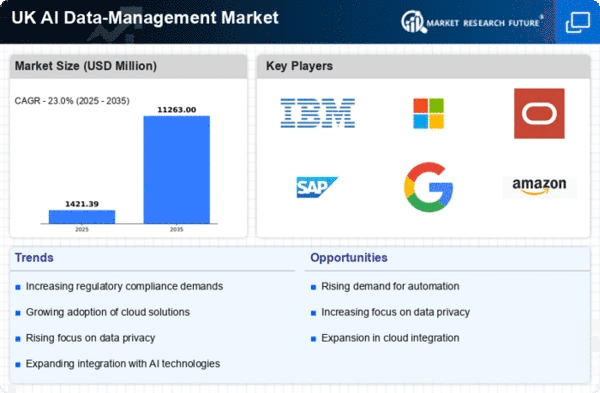Increased Focus on Data Security
Data security remains a paramount concern for organisations in the UK, particularly as cyber threats continue to evolve. The ai data-management market is responding to this challenge by offering advanced security features that protect sensitive information. With the increasing frequency of data breaches, businesses are prioritising solutions that incorporate AI-driven security measures. This focus on data protection is expected to drive market growth, as organisations seek to comply with stringent regulations and safeguard their reputations. The ai data-management market is projected to witness a growth of around 20% in the next few years, as companies invest in technologies that enhance data security and mitigate risks associated with data management.
Demand for Real-Time Data Processing
The demand for real-time data processing is becoming a critical factor in the ai data-management market. As businesses strive to make timely decisions based on the latest information, the need for solutions that facilitate real-time data analysis is increasing. This trend is particularly evident in sectors such as finance and retail, where timely insights can significantly impact performance. The ai data-management market is expected to grow by approximately 28% over the next few years, driven by the necessity for organisations to respond swiftly to market changes and customer needs. By leveraging AI technologies, companies can enhance their data management capabilities, ensuring they remain competitive in an ever-evolving landscape.
Emergence of Advanced Analytics Tools
The emergence of advanced analytics tools is reshaping the ai data-management market in the UK. These tools enable organisations to perform complex analyses and derive insights from large datasets with greater accuracy and speed. As businesses increasingly rely on data to inform their strategies, the demand for sophisticated analytics solutions is on the rise. The market is expected to grow by approximately 30% over the next five years, driven by the need for enhanced data visualisation and predictive analytics capabilities. Companies are recognising that leveraging AI in data management not only improves operational efficiency but also fosters innovation and drives business growth. Consequently, the ai data-management market is likely to see a significant influx of investment in advanced analytics technologies.
Rising Demand for Data-Driven Insights
The ai data-management market is experiencing a notable surge in demand for data-driven insights across various sectors in the UK. Businesses are increasingly recognising the value of leveraging artificial intelligence to extract actionable insights from vast datasets. This trend is evidenced by a projected growth rate of approximately 25% in the market over the next five years. Companies are investing in advanced data management solutions to enhance decision-making processes, improve operational efficiency, and gain a competitive edge. The integration of AI technologies into data management practices is becoming essential for organisations aiming to harness the full potential of their data assets. As a result, the ai data-management market is likely to expand significantly, driven by the need for sophisticated analytics and real-time data processing capabilities.
Growing Adoption of Cloud-Based Solutions
The shift towards cloud-based solutions is a key driver in the ai data-management market. UK organisations are increasingly adopting cloud technologies to enhance their data management capabilities, allowing for greater flexibility and scalability. This trend is supported by the growing need for remote access to data and the ability to manage large volumes of information efficiently. The ai data-management market is projected to grow by around 22% in the coming years, as businesses transition to cloud-based platforms that offer integrated AI functionalities. This adoption not only streamlines data management processes but also reduces operational costs, making it an attractive option for organisations looking to optimise their data strategies.
















